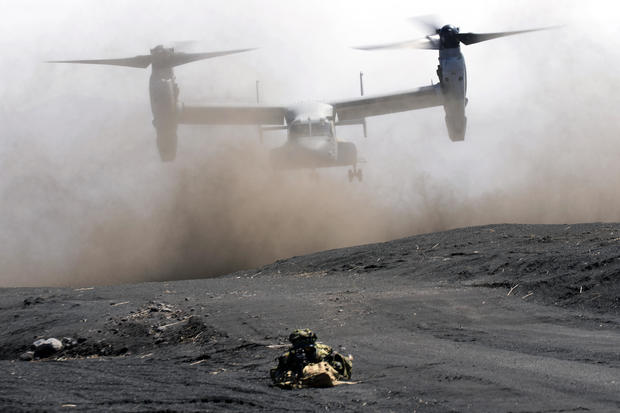CBS News
Japan keeps searching for crew of U.S. Osprey after crash at sea, asks U.S. to ground the planes temporarily

Tokyo — The search for seven American service members continued Thursday in Japan’s waters after a U.S. Air Force Osprey aircraft crashed into the sea off the tiny island of Yakushima, killing at least one person, according to U.S. and Japanese officials. The Japan Coast Guard remained in charge of the search and rescue operation and had deployed side-scan sonar to scour the seabed for evidence of the ill-fated Osprey.
Japanese coast guard vessels and helicopters were being aided in the search by craft from the Japan Self-Defense Forces, the nation’s military. Several pieces of debris believed to be from the Osprey were recovered from the water Wednesday, in addition to a large, empty orange life raft.
A U.S. defense official confirmed to CBS News on Wednesday that one of the crew members had died, after an official with Japan’s coast guard said a body was recovered from the water. Seven people remained missing.
Kyodo via REUTERS
U.S. Air Force Special Operations Command said in a statement later Wednesday that the Osprey was performing a routine training mission when it crashed, but it did not confirm that one of the crew members had died, saying the that both the “cause of the mishap” and the “crew’s condition are unknown at this time.”
Ospreys’ history of crashes, and tension with Japan
Japan’s Minister of Defense said Thursday that the country, one of America’s closest allies in Asia, had asked the U.S. to stop flying Ospreys over Japan until the aircraft could be confirmed safe.
The fact that the U.S. military has 30 of Ospreys in service in Japan is evidence that it believes the planes are safe, but Japanese politicians needed to reassure a very nervous public.
Tuesday’s crash took place very close to shore, fueling fear among the Japanese people after a series of incidents with the aircraft that one day, an Osprey could plunge out of the sky onto their heads and kill innocent civilians.
Damon Coulter/SOPA Images/LightRocket/Getty
It’s a contentious issue, and part of the wider contentious topic of the huge U.S. military presence in Japan, where there are some 50,000 American personnel stationed.
While the bilateral defense alliance has remained solid, there’s been tension for many years, and Tuesday’s crash will fuel it — in part because, while Japan’s Coast Guard scrambled ships and helicopters as soon as local fishermen raised the alarm, the U.S. military will likely take over the recovery and the investigation into the crash and, for the most part, exclude the Japanese.
In a statement shared Thursday on social media, U.S. Ambassador to Japan Rahm Emanuel expressed his “sincere gratitude to the Japanese Coast Guard, Japanese Self-Defense Forces, and local community and fishermen who are assisting in the search for the crew.”
“Our thoughts are with the servicemembers and their families. First and foremost, our focus is on the ongoing search and rescue operations, and we’re praying for a safe return,” Emanuel said, adding: “The strength of an alliance isn’t measured when times are good, but how we support each other in the face of adversity.”
Eugene Hoshiko/AP
Japan is the only country in the world apart from the U.S. to fly Ospreys. The Japan Self-Defense Forces has 11 of the U.S.-made aircraft already, and a few more on order.
The defense ministry said Thursday that it would temporarily ground its own fleet.
There have been a spate of fatal U.S. Osprey crashes in recent years, most recently an aircraft that went down during a multinational training exercise on an Australian island in August, killing three U.S. Marines and leaving eight others hospitalized. All five U.S. Marines on board another Osprey died the previous summer when their aircraft crashed in the California desert.
The U.S. military’s investigation found that “dual hard clutch engagement” leading to engine failure led to that crash. The U.S. Marine Corps and Navy have reported similar clutch slips in their Ospreys and said they have worked to address the issue, according to The Associated Press.
An Osprey crashed in shallow water just off the Japanese island of Okinawa in 2016, but all the U.S. Marines on board survived that incident.
Despite the crashes, the versatility of the Osprey — which can take off and land like a helicopter but then tilt its rotors to fly as a turbo-prop plane — has made it a trusty workhorse for the U.S. military, especially for troop transport.
Both the Japanese and U.S. militaries will likely want to be able to continue using them in the highly strategic corner of the western Pacific.
Japanese reporters said they had seen saw multiple U.S. Ospreys take off Thursday from Okinawa, where the U.S. has its biggest military base in the region, so there was no sign that the U.S. was acting on Japan’s request for a grounding of the aircraft.
CBS News
Transcript: Ret. Gen. Frank McKenzie on “Face the Nation with Margaret Brennan,” Oct. 6, 2024

The following is a transcript of an interview with retired Gen. Frank McKenzie, former commander of U.S. forces in the Middle East, on “Face the Nation with Margaret Brennan” that aired on Oct. 6, 2024.
MARGARET BRENNAN: To discuss the ongoing conflict in the Middle East, we go now to retired General Frank McKenzie, who was the former commander of US forces in the Middle East. It’s good to have you back with us, General, we saw–
GENERAL FRANK MCKENZIE: Good to be with you, Margaret.
MARGARET BRENNAN: We saw the US and Israel say there would be severe consequences for what Iran did with those 180 missiles fired at Israel, President Biden said he doesn’t support an Israeli strike on Iran’s nuclear facilities, and he’d be thinking instead about alternative targets to oil fields. What do you expect the US to do, and what do you expect to happen in the next few days?
GEN. MCKENZIE: Well, Margaret, let’s begin by saying Iran is the country that’s in a corner. Their strike against Israel several nights ago was not particularly successful. Their principal ally in the region, Hezbollah has been decapitated, and its own offensive capability is gravely limited. Hezbollah’s is gravely limited. So Iran’s on their back heel. Israel has a lot of choices here. They can choose for something that would be very escalatory in terms of a strike against the Supreme Leader himself, perhaps, or against the nuclear program, or against the oil infrastructure, or they could look at military intelligence targets. They have a wide variety of options that they can choose from. They have the capability to execute most of those attacks, I will say this, the nuclear target is a very difficult target. It’s large and complex. I held the plans for that when I was a central command commander. I’m very familiar with it. There are a lot of other alternatives to that target that perhaps you could go after first, then hold out in case you get into an escalatory ladder with the Iranians. But the Israelis are certainly going to hit back, and I predict it will be larger than the very restrained, very modulated response that we saw in April after the first large Iranian attack on Israel.
MARGARET BRENNAN: You heard the Republican Chair of the House Intelligence Committee not advocate for an attack on nuclear facilities, but say it shouldn’t be taken off the table. It’s been widely reported for some time, General that it’s only the United States who could effectively take out the underground facilities that Iran has. Does that remain the case?
GEN. MCKENZIE: Well, let me begin by saying you should never take a potential target off the menu. You want your adversary to have to plan to defend everything. So giving-giving them assistance and not knowing and not-not having to defend against a particular target is probably not the best way to establish this kind of deterrence. Having said that, the Iranian nuclear target is a very difficult target, we have special capabilities that allow us to get at it. The Israelis do not have all of those capabilities. They can certainly hurt this target if they choose to, if they choose to strike it. But again, because of its size, complexity and scope and how it’s expanded over the last 10 years, it’s a very difficult target to take out. It would be very resource intensive, and I would just, I would argue, just from a purely military point of view, there are perhaps targets that are more productive to hit in an initial response.
MARGARET BRENNAN: Do you want to give us some options?
GEN. MCKENZIE: Well, again, you know, we talked about some of them. I think oil infrastructure is certainly a possibility. And the oil infrastructure can be very broad. You can look at refineries, you can look at storage facilities, you can look at locations where the oil is unloaded onto ships. So within the oil target, it’s not monolithic. You can- you can be escalatory or less escalatory, as you look at targets there. That might be something to take a look at, but I’ll tell you the other thing, Margaret, is the Iranians made a big show of targeting the Mossad headquarters in urban Tel Aviv. Israel certainly has the capability to go after IRGC, Islamic Republican Guard Corps headquarters and intelligence buildings all around Tehran or anywhere else. Again, as we know from April, Israel has the ability to operate not with impunity, but with great force over Iran at a time and place of their choosing. And I’m sure they’re thinking about all those options right now.
MARGARET BRENNAN: There’s also that risk of unintended consequences, since you’ve characterized Iran as cornered here, are you at all concerned that this could be the kind of event that would trigger them to actually pursue a nuclear weapon? They’ve given themselves options, but they’ve never fully pursued it in the way that US intelligence has said the supreme leader would have to make the ultimate decision to do. Could this be the trigger event?
GEN. MCKENZIE: Margaret, it’s always been my belief that the Iranians flirt with breakout, with getting fissile material to create a bomb in order to extract concessions from us, because we dance, we’re very eager to come to an agreement with them on the nuclear issue, so they know they can get stuff from us. They also know if they cross that line, you can’t go back. That’s a Rubicon that can’t be recrossed. But even if they, even if they do develop the fissile material, which they can do, within a matter of days or weeks, they still have a delivery problem. They’ve got to create a missile and an entry system that will allow it to take the missile to Tel Aviv or whatever target they choose. That’s a matter of many months, and that’s the valley of death for Iran, because during that period of time, they will have declared nuclear, and they will be vulnerable. It’s not a physics problem, then it’s an aeronautical engineering problem, and the aeronautical engineering systems in Iran are going to be vulnerable to attack. So it’s not as easy as you might think for them to just declare, you know, we’re going nuclear, or to go nuclear. They’ve got to balance a number of things as they do that.
MARGARET BRENNAN: Important context. If I can ask you, sir, former President Trump, as you know, faces an ongoing assassination threat as revenge for ordering the killing of Qassim Soleimani, that Iranian general. You played a key role in that, and I know you face threats as well. Mr. Trump recently said, big threats on my life by Iran. The entire US military is watching and waiting. The Biden White House has condemned the threats, but some Republicans say it’s not loud enough. How do you think this should be messaged? Do you think Iran is getting the message not to go through with this?
GEN. MCKENZIE: So whenever we look at Iran, we need to look at what’s their basic motivation. The principal goal of Iranian statecraft is regime preservation. They view the election of President Trump as a direct threat to that regime preservation. So I have no doubt believing that Iran is very active in its attempts to go after the former president, as well as other officials, of which I am keenly, personally interested as well. But I think that-that’s what’s driving their behavior. Is desperation. Margaret, it’s actually the same sort of desperation that drove the massive attack on Israel of three or four nights ago. They’re in a corner and they really don’t have any good options, but they don’t want to sit still and do nothing. They view President Trump as worse than the alternative that could be elected.
MARGARET BRENNAN: General, thank you for your analysis.
CBS News
Transcript: Sen. Mark Kelly on “Face the Nation with Margaret Brennan,” Oct. 6, 2024

The following is a transcript of an interview with Sen. Mark Kelly, Democrat of Arizona, on “Face the Nation with Margaret Brennan” that aired on Oct. 6, 2024.
MARGARET BRENNAN: Joining us now is Arizona’s Democratic Senator, Mark Kelly. He’s in Detroit this morning on the campaign trail for the Harris campaign. Good morning to you, Senator.
SEN. MARK KELLY: Good morning, Margaret.
MARGARET BRENNAN: I want to talk to you about Arizona, but let’s start in Michigan, which is where you are right now. And it is going to be such a key state to a potential Harris or Trump victory. Vice President Harris is facing challenges among black men, working class people, as well as the Muslim and Arab populations skeptical of the White House support for Israel’s wars. What are you hearing on the ground there from voters?
SEN. KELLY: Well, my wife, Gabby Giffords, and I have been out here for a couple days. We’ve been campaigning across the country, Michigan, I’ve been in North Carolina, Georgia as well. I’ll be back to Arizona here soon. The vice president was out here speaking to Muslim organizations and the Arab community about what is at stake in this election and addressing the concerns that they have. What we’re hearing, issues about the economy, about gun violence, about, you know, supporting American families and the difference between Donald Trump and Kamala Harris. You know, Kamala Harris, who has a vision for the future of this country, Donald Trump, who just wants to drag us backwards.
MARGARET BRENNAN: Today in Dearborn, Michigan, there’s a funeral service for an American man who was killed in Lebanon by an Israeli airstrike. It just underscores how that community you’re talking about out in Michigan feel some of what’s happening in a personal way to their community. Given how close this race is, do you think this war and the expectation it could escalate could cost Democrats both a seat in the Senate and potentially the presidency?
SEN. KELLY: Margaret, nobody wants to see escalation and it’s tragic when any innocent person, whether it’s an American or Palestinian, lose their life in a conflict. Tomorrow’s one year since October 7th, when Israel was violently attacked. Israel has a right to defend itself, not only from Hamas, but from Hezbollah and from the Iranians. But, you know, I and my wife, you know, we feel for the community here who’s been affected by this. And that’s why the vice president was out here earlier, a few days ago, meeting with that community.
MARGARET BRENNAN: But it’s a live issue.
SEN. KELLY: Yeah, sure. I mean, there is an ongoing conflict in the Middle East. Israel is, you know, fighting a war now on, I think it’s fair to say, two fronts and then being attacked by the Iranians as well. And, they- they need to defend themselves, and we need to support our Israeli ally. At the same time, when women and children lose their life, innocent people in a conflict, it is- it is tragic.
MARGARET BRENNAN: You do sit on the Senate Intelligence Committee and so I know you know how intense the efforts are by foreign actors to try to manipulate voters going into November. Just this Friday, Matthew Olsen, the lead on election threats at the Department of Justice, told CBS the Russians are, quote, highlighting immigration as a wedge issue. That is such a key issue in Arizona. Are you seeing targeted information operations really focusing in on Arizonans right now?
SEN. KELLY: Not only in Arizona, in other battleground states. It’s the Russians, the Chinese, the Iranians, and it’s significant. And we need to do a better job getting the message out to the American people that there is a huge amount of misinformation. If you’re looking at stuff on Twitter, on TikTok, on Facebook, on Instagram, and it’s political in nature, and you may- might think that that person responding to that political article or who made that meme up is an American. It could be- it could look like a U.S. service member. There is a very reasonable chance I would put it in the 20 to 30% range, that the content you are seeing, the comments you are seeing, are coming from one of those three countries: Russia, Iran, China. We had a hearing recently, with the FBI director, the DNI, and the head of the National Security Agency. And we talked about this. And we talked about getting the word out. And it’s up to us, so thank you for asking me the question, because it’s up to us, the people who serve in Congress and the White House to get the information out there, that there is a tremendous amount of misinformation in this election, and it’s not going to stop on November 5th.
MARGARET BRENNAN: Understood. And we will do our best to help parse that for viewers. But on the topic of the border, President Biden did announce just this past week new regulations to keep in place that partial asylum ban that he rolled out back in June. That’s what’s credited with helping to bring down some of the border crossing numbers in recent weeks. It was supposed to be a temporary policy, dependent on how many people were crossing at a time. Do you think this is the right long term policy, or is this just a gimmick to bring down numbers ahead of the election?
SEN. KELLY: Well, the right long term policy is to do this through legislation. And we were a day or two away from doing that, passing strong border security legislation supported by the vice president, negotiated by the vice president, and the president and his Department of Homeland Security, with Democrats and Republicans–
MARGARET BRENNAN: But this is not legislation.
SEN. KELLY: –This is bipartisan. This isn’t. But the legislation was killed by Donald Trump. We were really close to getting it passed. That’s the correct way to do this. When you can’t do that, Margaret, when a former president interrupts the legislative process the way he did, which is the most hypocritical thing I’ve ever seen in my three and a half years in the Senate. After that happened, the only other option is executive actions. And this has gone from what was chaos and a crisis at our southern border to somewhat manageable. And if you’re the border- Border Patrol, you know, this is this- you need this. I mean, otherwise it is unsafe for Border Patrol agents, for CBP officers, for migrants, for communities in southern Arizona. So it’s unfortunate that this was the- these were the steps that had to be taken.
MARGARET BRENNAN: Okay.
SEN. KELLY: But that’s because the former president didn’t allow us to do this through legislation.
MARGARET BRENNAN: Senator, we have to leave it right there. Face the Nation will be right back.
CBS News
10/6: Sunday Morning – CBS News

Watch CBS News
Be the first to know
Get browser notifications for breaking news, live events, and exclusive reporting.












